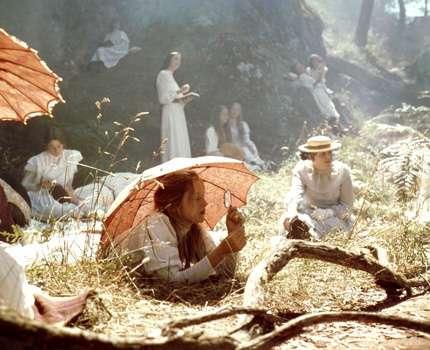Peter Weir’s “Picnic at Hanging Rock” has something of the same sense of mystery and buried terror as Antonioni’s “L’Avventura” – another film about a sudden and disquieting disappearance. But it’s more lush and seductive than Antonioni’s spare black and white images: Weir films an Australian landscape that could be prehistoric, that suggests that men have not come this way before… and that, quite possibly, they should not have come this time.
“This time” is 1900, when much of Australia remained unseen by European eyes, but when a staid and proper version of European culture had been established at such places as Appleyard College, presented here as a boarding school for very proper young ladies. As is almost always the case in movies about proper boarding schools, an undercurrent of repressed sexuality runs through Appleyard, and especially through the person of its headmistress (Rachel Roberts).
We get a preliminary sense of that in the film’s opening scenes, which show several of the young ladies preparing to spend the day picnicking at nearby Hanging Rock, a geologic outcropping from time immemorial. And then there is the picnic itself, with the girls in their bonnets and parasols and immaculate white dresses, dappled in sunlight.
The film moves here at a deliberately lazy pace. The sun beats down, insects drone – and four of the young ladies, having climbed halfway up into the rock, are overcome by torpor. When they awake, three of them climb further on, never to be seen again. The fourth, badly frightened, returns to the main group. A search is set into motion, and the local constable questions witnesses who saw the young girls later on in the day, but the mystery of their disappearance remains unsolved.
It’s that very inconclusiveness, linked with later scenes in which the cruel nature of the headmistress is developed, that makes “Picnic at Hanging Rock” so haunting. What’s going on here, we ask, knowing there is no possible answer and half-pleased by the enigma. The film opens itself to our interpretations: Is the disappearance a punishment, real or imagined, for the girls’ stirring sexuality? Is it a rebuke from the ancient landscape against the brash inroads of civilization? Or is it, as it was in the famous Antonioni film, a statement of nihilism: These people have disappeared, so might you, it all matters nothing, life goes on meaninglessly.
“Picnic at Hanging Rock” of course subscribes to none of those readings or to any reading. I’ve heard its ending described as inconclusive (it is) and frustrating (ditto). But why not? Do we want a rational explanation? Arrest and trial for vagabond kidnapers? An autopsy revealing broken necks? Poisonous snakes named as the culprits? If this filmhada rational and tidy conclusion, it would be a good deal less interesting. But as a tantalizing puzzle, a tease, a suggestion of a forbidden answer just out of earshot, it works hypnotically and very nicely indeed.




















